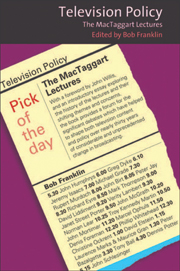Book contents
- Frontmatter
- Contents
- Acknowledgements
- Foreword
- Introduction
- The James MacTaggart Lectures
- TV Drama: The Case against Naturalism
- Naturalism and Television
- Taboos in Television
- Signposting Television in the 1980s: The Fourth Television Channel
- Television Drama, Censorship and the Truth
- The Day after Tomorrow: The Future of Electronic Publishing
- The Primacy of Programmes in the Future of Broadcasting
- Reflections on Working in Film and Television
- ‘Opening up the Fourth Front’: Micro Drama and the Rejection of Naturalism
- Power and Pluralism in Broadcasting
- Ethics, Broadcasting and Change: The French Experience
- Freedom in Broadcasting
- Deregulation and Quality Television
- The Future of Television: Market Forces and Social Values
- The Future of the BBC
- Occupying Powers
- A Culture of Dependency: Power, Politics and Broadcasters
- Talent versus Television
- A Glorious Future: Quality Broadcasting in the Digital Age
- Rewarding Creative Talent: The Struggle of the Independents
- Television versus the People
- Public-Interest Broadcasting: A New Approach
- A Time for Change
- The Soul of British Television
- Television's Creative Deficit
- Freedom of Choice: Public-Service Broadcasting and the BBC
- First Do No Harm
- Appendix A Edinburgh International Television Festival, 29 August–2 September 1977: Programme
- Appendix B Précis of Ted Turner, James MacTaggart Lecture 1982; Dr Jonathan Miller, James MacTaggart Lecture 1983
- Index
Television's Creative Deficit
from The James MacTaggart Lectures
Published online by Cambridge University Press: 05 August 2013
- Frontmatter
- Contents
- Acknowledgements
- Foreword
- Introduction
- The James MacTaggart Lectures
- TV Drama: The Case against Naturalism
- Naturalism and Television
- Taboos in Television
- Signposting Television in the 1980s: The Fourth Television Channel
- Television Drama, Censorship and the Truth
- The Day after Tomorrow: The Future of Electronic Publishing
- The Primacy of Programmes in the Future of Broadcasting
- Reflections on Working in Film and Television
- ‘Opening up the Fourth Front’: Micro Drama and the Rejection of Naturalism
- Power and Pluralism in Broadcasting
- Ethics, Broadcasting and Change: The French Experience
- Freedom in Broadcasting
- Deregulation and Quality Television
- The Future of Television: Market Forces and Social Values
- The Future of the BBC
- Occupying Powers
- A Culture of Dependency: Power, Politics and Broadcasters
- Talent versus Television
- A Glorious Future: Quality Broadcasting in the Digital Age
- Rewarding Creative Talent: The Struggle of the Independents
- Television versus the People
- Public-Interest Broadcasting: A New Approach
- A Time for Change
- The Soul of British Television
- Television's Creative Deficit
- Freedom of Choice: Public-Service Broadcasting and the BBC
- First Do No Harm
- Appendix A Edinburgh International Television Festival, 29 August–2 September 1977: Programme
- Appendix B Précis of Ted Turner, James MacTaggart Lecture 1982; Dr Jonathan Miller, James MacTaggart Lecture 1983
- Index
Summary
Mark Thompson's MacTaggart Lecture identifies a ‘creative deficit’ in British television resulting in many programmes appearing ‘dull and mechanical and samey’. The culprit is not competition (identified by David Liddiment in the 2001 MacTaggart Lecture), which can have positive effects, but a twofold conservatism: the ‘risk-aversion of the schedule’ in tandem with ‘an older cultural conformism’. Even Channel 4, which was initially inspired by a commitment to risk, diversity, originality and a schedule in which ‘everything was an experiment’, has become ‘distracted by its ambitious digital plans’ and allowed its ‘creative decision-making to become too centralised and risk-averse’.
Thompson argues that Channel 4 must be revitalised to resume its place as ‘the creative space in the centre of British television’ where it must offer a distinctive kind of public-service programming to the BBC: ‘an improvised rhythm of experimentation and alternative ideas against the steady drum-beat of information, education and entertainment’. To achieve this, Thompson promises a fundamental review and restructuring of the schedule at Channel 4. But creative thinking alone will not suffice: the channel faces financial and other difficulties. Thompson rejects privatisation since ‘independence is a vital part of Channel 4's DNA’, but hints at the need for public support in the deregulated television market place. Government legislation, moreover, promises to liberalise media ownership in the commercial sector – creating the prospect of a single owner for Channel 3 – with evident and deleterious implications for the public sector of broadcasting, including Channel 4.
- Type
- Chapter
- Information
- Television PolicyThe MacTaggart Lectures, pp. 245 - 254Publisher: Edinburgh University PressPrint publication year: 2005



